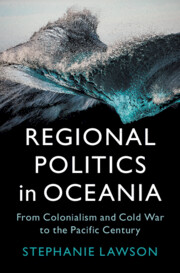Book contents
- Regional Politics in Oceania
- LSE International Studies
- Regional Politics in Oceania
- Copyright page
- Dedication
- Contents
- Preface
- Acknowledgements
- A Note on Sources and References
- Abbreviations
- Maps
- 1 Oceania and the Study of Regions
- 2 Demarcating Oceania
- 3 Colonizing Oceania
- 4 Regionalizing Oceania
- 5 Transformations in Regional Organization
- 6 Regionalism the ‘Pacific Way’
- 7 The Politics of Subregional Identity
- 8 The Forum in Regional Politics
- 9 Democracy and Culture in Regional Politics
- 10 The Spectre of Regional Intervention
- 11 The Political Economy of Regionalism
- 12 Geopolitics in the Pacific Century
- 13 Conclusion
- Select Bibliography
- Index
5 - Transformations in Regional Organization
Published online by Cambridge University Press: 15 February 2024
- Regional Politics in Oceania
- LSE International Studies
- Regional Politics in Oceania
- Copyright page
- Dedication
- Contents
- Preface
- Acknowledgements
- A Note on Sources and References
- Abbreviations
- Maps
- 1 Oceania and the Study of Regions
- 2 Demarcating Oceania
- 3 Colonizing Oceania
- 4 Regionalizing Oceania
- 5 Transformations in Regional Organization
- 6 Regionalism the ‘Pacific Way’
- 7 The Politics of Subregional Identity
- 8 The Forum in Regional Politics
- 9 Democracy and Culture in Regional Politics
- 10 The Spectre of Regional Intervention
- 11 The Political Economy of Regionalism
- 12 Geopolitics in the Pacific Century
- 13 Conclusion
- Select Bibliography
- Index
Summary
From the mid-1960s, Pacific Island leaders needed to start managing the regional agenda. But if the South Pacific Commission (SPC) was to survive and keep the French within its fold, it could not open up to political issues. This led to the formation of an additional organization: the South Pacific Forum. Its membership included Australia and New Zealand, both keen to see Island leaders create a new body. Ratu Mara of Fiji was a major figure at this time, but there was an apparent contradiction between his opposition to colonial control within the SPC and within Fiji, where he was initially equally opposed to independence. The UK, however, was determined to end its obligations in the Pacific – in stark contrast with French attitudes. It would therefore be a mistake to assume that the colonial powers were all aligned on one side of a divide, resisting moves by an equally united group of Island countries agitating for decolonization on the other.
Keywords
- Type
- Chapter
- Information
- Regional Politics in OceaniaFrom Colonialism and Cold War to the Pacific Century, pp. 112 - 141Publisher: Cambridge University PressPrint publication year: 2024

